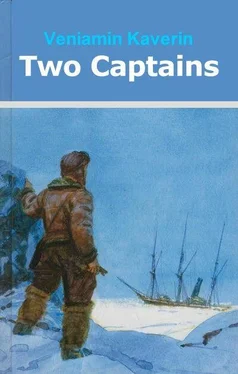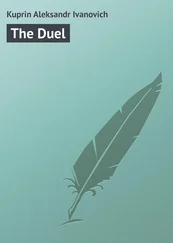It's a pity I can't give a drawing of the rather intricate stunt I had to perform in order to drop my torpedo as accurately as possible. I had to make a second run-up, as my first attack was unsuccessful. Then we started to creep away. Creep is the word, because, as it soon became clear, the Germans had not lost time either.
During my first target run the gunner had shouted: "Cabin full o' smoke!"
We felt three jarring shocks during my second run, but there was no time to think of that, as I was already on top of the raider, my teeth clenched. Now, however, I had enough time to realise that our aircraft was crippled. Petrol and oil were siphoning away through holes and but for the navigator, who set going a new gadget in the nick of time, we would have been in flames long ago. The starboard propeller had changed over, while we were still on the target, from a little pitch to a big pitch, then to a very big one-a gigantic one, you might say.
We had our emergency boats, of course, and I could have ordered the crew to bale out. But we had tested these boats near Archangel on a quiet little inland lake, and had had to clamber out of the water, shivering like dogs. And here we had below us an inhospitable, cold sea covered with sludge ice.
I shall not list the brief reports concerning the state of the machine which my crew made to me. There were many of them, too many to my liking. After one of them, a pretty gloomy one, the navigator asked: "Sticking it out, Sanya?"
"You bet!"
We had entered a cloud, and in the double ring of a rainbow I saw below the clear-etched shadow of our plane. Unfortunately it was losing height. Without my having a hand in it, the plane suddenly turned sharply over on its wing, and if it were possible to see Death, we should undoubtedly have seen it on that wingtip pointed perpendicular to the sea.
I don't know how I did it, but I managed to right the machine. To lighten it I ordered the gunner to jettison the machine-gun drums. Ten minutes later the guns themselves followed them, toppling, into the sea.
"Sticking it out, Sanya?"
"Sure!"
I asked the navigator how far it was to the shore, and he answered that it wasn't far, about twenty-six minutes. He lied, of course, to cheer me up-it would take us all of thirty minutes to reach the shore.
This was not the first time in my life that I was called upon to count the minutes. There had been occasions when I had counted them with despair and rage. There had been occasions when they had lain upon my heart like round heavy stones, and I had waited in an agony of suspense for one more crushing minute-stone to roll off and away into the past.
Now I was not waiting. With a furious abandon that sent an exultant thrill through my heart I hurried and goaded them on.
"Will we make it, Sanya?"
"You bet we will!"
And we did. Some half a kilometre from the shore, which we did not even have time to look at, we pancaked into the water, and, strange to say, we did not go to the bottom. We had hit a sandbank. On top of all our troubles we now had icy waves drenching us from head to foot. But what did these waves matter or the fact that our aircraft had been staggering about in the sky for over an hour till we reached the shore, or the thousand and one new labours and troubles that awaited us, compared with that laconic phrase in the current communiquй of Sovinformbureau: "One of our aircraft failed to return."
What made me think that this was Middendorf Bay, and that consequently we had landed far from any habitation? I don't know. The navigator had had no time to work it out while we were passing over the sea-the only course that interested him was the shoreward one. And now he was too busy, as I had ordered the machine to be made secure, and we worked at this until we dropped from sheer exhaustion on dry patches of the beach among the sun-warmed rocks. We lay there quietly, gazing up at the sky-a clear, wide sky without a cloudlet in it-each occupied with his own thoughts. But each one's thoughts were tinctured by the same common feeling-victory.
We were so exhausted that we did not even have the strength to brush the clinging sand from our faces, and it dried in the sun and fell away in pieces. Victory. The navigator's dead pipe lay on his chest. He suddenly gave a loud snore and it rolled off. Victory. We wanted nothing but to gaze at the radiant blue majesty of the sky and feel the warm pebbles under our hands. Victory.
Everything was victory, even the fact that we were ravenously hungry and I couldn't force myself to get up and fetch the sandwiches from the plane which Anna Stepanovna had given me for the journey.
There is no need to describe how carefully we looked over the plane. Evidently the cause of the smoke which the gunner had reported was a shell, which had exploded in the cabin. Apart from a couple of hundred shot holes, the aircraft seemed in fairly decent shape, at least compared with the heaps of scrap iron I had often had occasion to land. The only thing wrong with it was that it could no longer be flown, and we did not have the means to put the engine right.
Over our dinner-we had an excellent meal: the first course, a soup made of dried milk, chocolate and butter, and second course, the same soup in dry form-it was decided:
(a) that the aircraft be made fast where it lay, embedded deep in the sand-in any case we could not raise it on to the shelving beach;
(b) that the gunner be left to guard the machine;
(c) that we go in search of people and assistance.
I forgot to mention that while we were limping across the sea one of us-I believe it was the radioman-noticed on the shore what looked like a house or a wooden towerlike structure. It disappeared round a bend when we came inshore. It may have been a landmark, one of those structures raised on a shore which is seldom visited by ships. If so, it could be of little use to us. But if it was not?
On the other hand, we could stay where we were, and after our meal, lie down again among the rocks, choosing a cosy, sheltered spot, relaxing and gazing at the bluish ice-floes drifting past with the water running off them, glistening and tinkling. But our radio, worse luck, was smashed, and no matter what the dogged radioman did to it, it stayed mute as a stone.
In short, there was nothing for it but to push on. Where to? Obviously, towards the landmark, which might prove to be an electric lighthouse or a fog-warning station or something else of that kind.
"But first of all," I said to the navigator, "where are we?"
It took him no less than a quarter of an hour to answer that question; he gave coordinates which though differing from those I had named when Ledkov had asked me where I thought the remains of Captain Tatarinov's expedition could be found, were so close to that point-the point on which I had put my finger on Ledkov's map- that I couldn't help looking round me, as if expecting to see the Captain himself standing within two paces of me, behind that rock there…
PART TEN
THE LAST PAGE
Chapter one
THE RIDDLE IS SOLVED
Another book would have to be written to fully describe how Captain Tatarinov's expedition was found. Strictly speaking I had very many clues, much more than, for instance, the famous Dumont d'Urville had, when, as a boy, he showed with amazing accuracy where he would find La Perouse's expedition. I had it easier than he, because the life of Captain Tatarinov was closely interwoven with my own, and the conclusions which these clues led to concerned me as well as him.
This is the route he must have taken if it be accepted that he returned to Severnaya Zemlya, which he had named Maria Land: from 79°35' latitude, between meridians 86 and 87, to Russian Islands and the Nordenskjold Archipelago. And then, probably after wandering around a good deal, from Cape Sterlegov to the mouth of the Pyasina, where the old Nenets had come across the boat on the dog-sledge. Then to the Yenisei, because the Yenisei was his only hope of finding people and assistance. He had kept to the seaward of the offshore islands, going in as straight a line as possible.
Читать дальше












